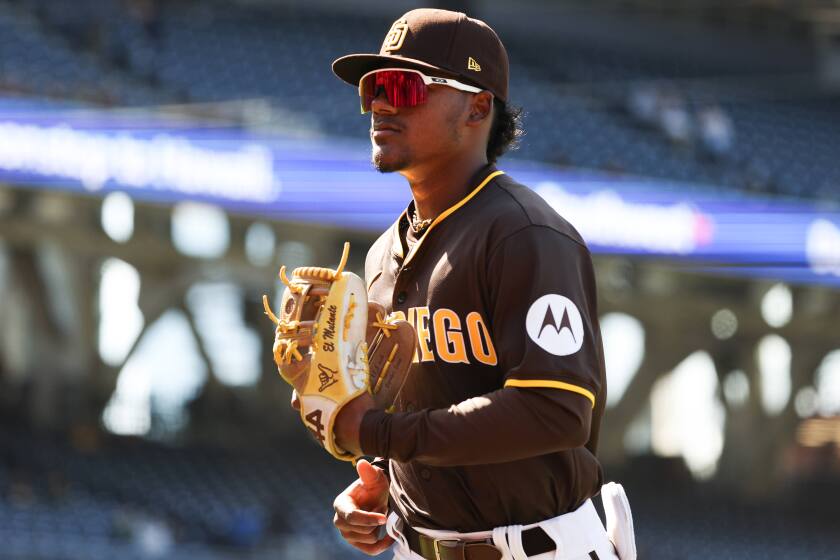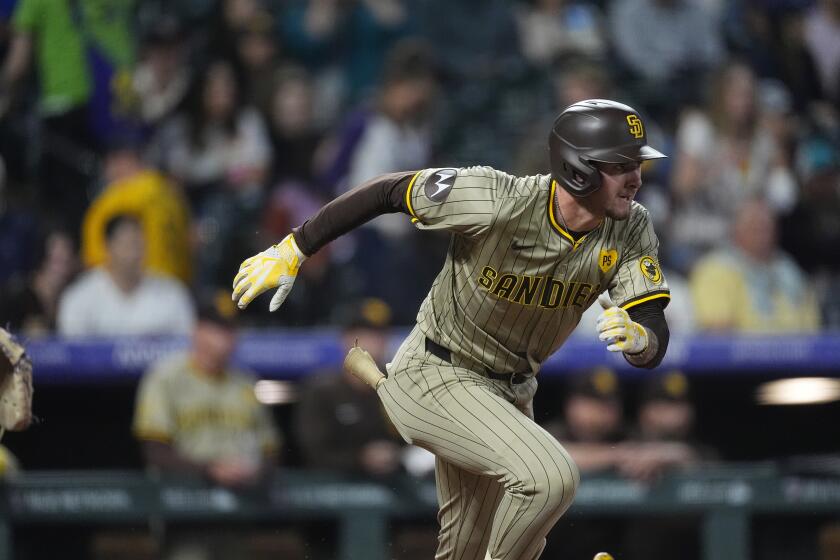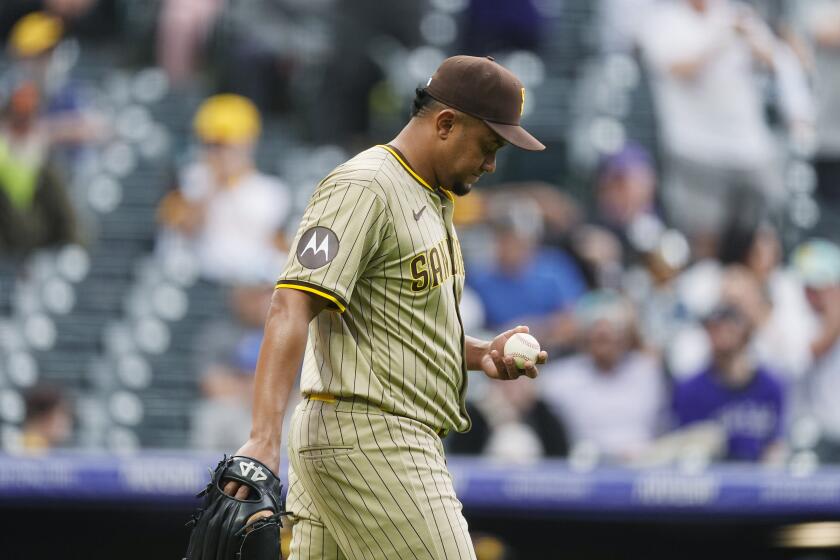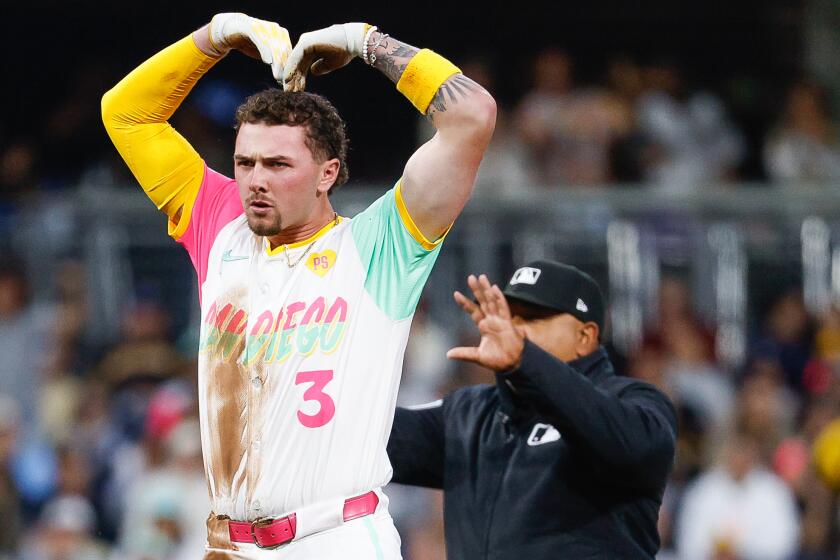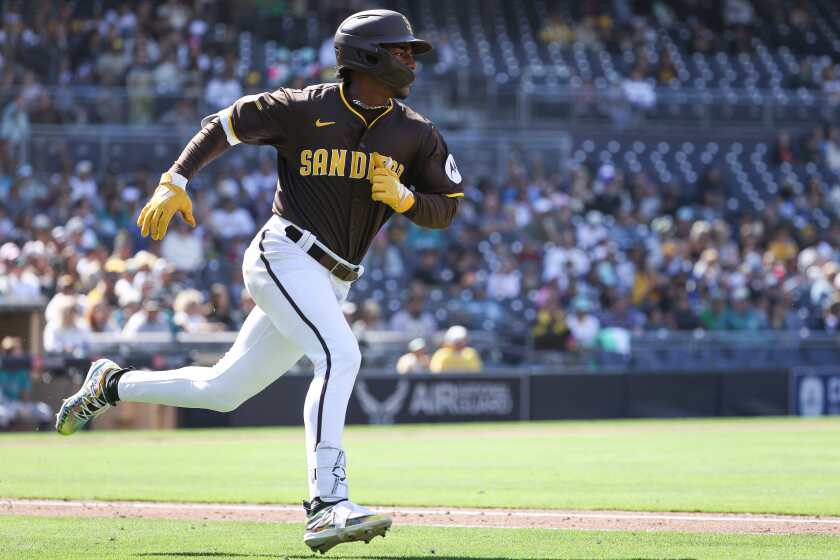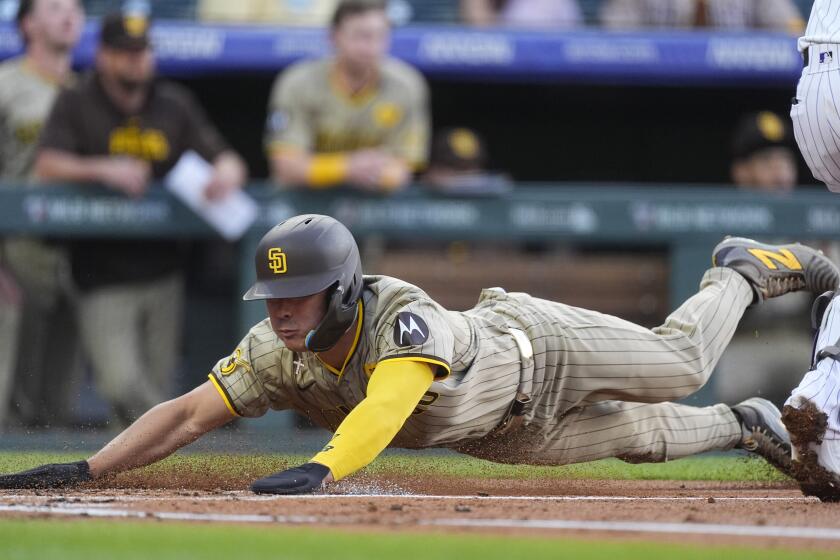Talking with ... Wil Myers, the longest-tenured Padre
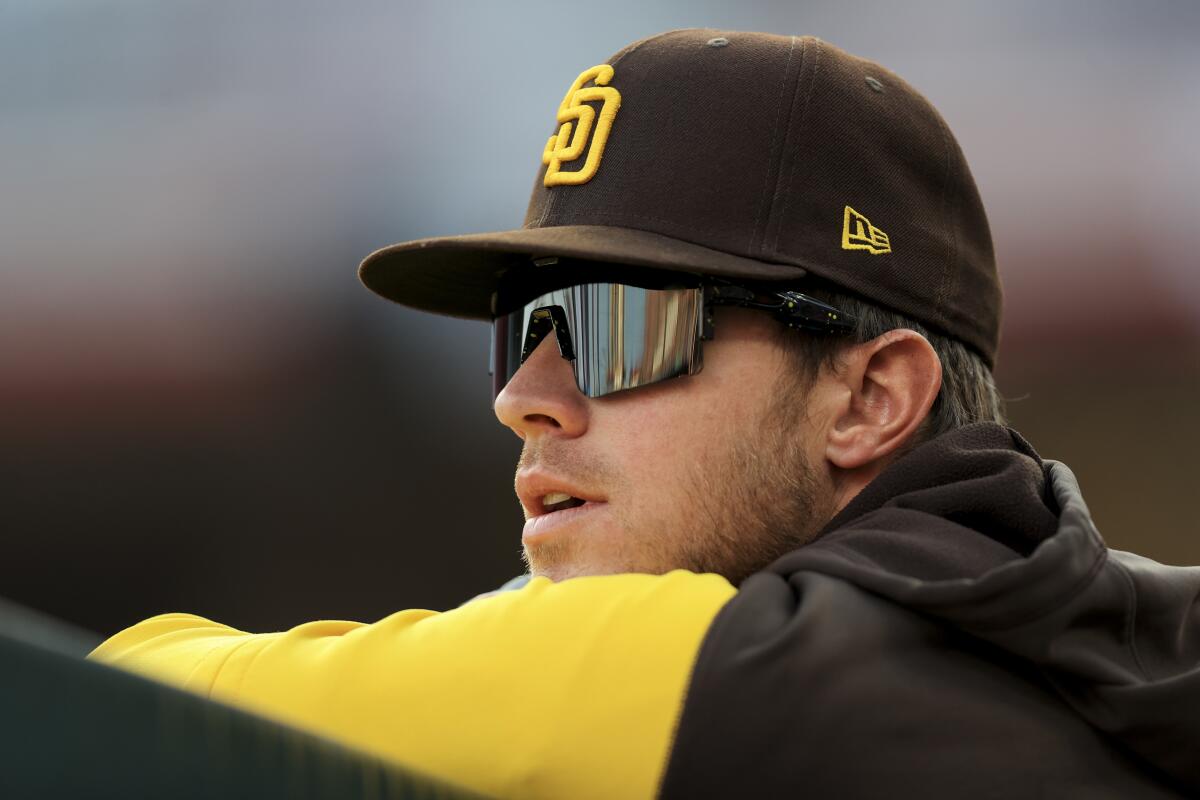
Wil Myers on his time with the Padres as he finishes what could be his last homestand in San Diego
In each of Wil Myers’ first five seasons with the Padres, the team finished last or next-to-last in the National League West. As the franchise has added superstar players, there have been more wins. The Padres are now on the brink of reaching the playoffs for the first time since 2006 in a 162-game season.
As the longest-tenured Padres player, Myers has had a unique vantage point from which to experience the transformation. He signed a six-year, $83 million contract extension in 2017 and is now playing out the final week of the guaranteed portion of that contract.
The American League Rookie of the Year for the Tampa Bay Rays in 2013 and an All-Star for the Padres in 2016, Myers’ career has been characterized by streakiness. He has hit .254/.328/.441 over his 10 big-league seasons.
Especially since his return from the injured list on Aug. 1, he has been an integral part of the team, starting games at first base and all three outfield spots, as well as playing third base and pitching.
Myers, 31, grew up in North Carolina. His parents began calling him ‘“Wil” and using just one “l” when spelling the name. He is one of the few major league players who does not wear batting gloves when he hits.
Union-Tribune: You and I are doing this interview with nine games left in the regular season. You’re a free agent when this year ends, so these could be your final games with the Padres after eight seasons in San Diego. I know you’re in a playoff push but have you felt that in recent weeks, that this — at least for now — is the end?
Myers: I think anytime you sign a contract, you want to finish it off where you signed it and fortunately enough, I was able to do that. We’ve been through some ups and downs here in San Diego but it’s pretty cool that the last nine games here mean the most, more than any other games I’ve played here in San Diego. That’s very exciting.
U-T: Are you sad or sentimental at all?
Myers: I definitely don’t want to say sad. I have nothing but good memories here. I’m very grateful for this organization and the fan base as well. It’s been a lot of fun. Sure, all good things come to an end, but it was a great time in San Diego. Hopefully we can really put an exclamation point on it in my last year and get to the playoffs, here in front of the fans.

U-T: Would you consider coming back to San Diego?
Myers: Of course I’d consider coming back to San Diego. I’ve enjoyed my time here. Definitely don’t want to close the book or anything like that. We’ll see what happens. But you never know how free agency goes. It’s my first time in it, so we’ll see how it goes.
U-T: Have you talked to (President of Baseball Operations) A.J. Preller about possibly coming back?
Myers: No, I have not talked to A.J. about that. I think that’s something that is done on the business side, that I stay away from, and I think he’s got more important things right now to worry about opposed to seeing if I’m coming back next year.
U-T: Like making the playoffs. All right, let’s go back in time to April 6, 2015. Do you know what the significance of that date is?
Myers: First game I played with the Padres. It was in L.A. and (Clayton) Kershaw, he hit me with one of the first pitches. It was an (0-2) pitch. I’ll never forget.
U-T: Yes, you were leading off and the starting center fielder. Matt Kemp, Jedd Gyorko, Cory Spangenberg were your teammates. The roster has changed quite a bit during your time here, but what about the organization? Have you seen a culture shift that’s tangible?
Myers: Yeah, I think so. One thing that’s been really cool to see is the shift in the organization becoming kind of — I don’t want to say it was irrelevant, but definitely not relevant, like talked about on the national stage like we are now. So it’s been really cool to see that come full circle, to see an organization be on the bottom and then kind of come up to the top. That’s been really sweet. And to see the roster shift is really cool. We go from a lot of guys from eight years ago who aren’t really here anymore to a lineup with a bunch of superstars. Hats off to this organization and the front office for getting those things done.
U-T: You’re the longest-tenured Padre on this roster. Is there anything you look back on where you’re like, ‘Wow, this is just so different than how it used to be.’
Myers: Well, I’ll tell you what, the colors are different (laughs). I came up with navy. The brown and yellow is really cool. And it’s cool to see the city really get behind this team. I heard that we have (25) sellouts now, which is a record, so that’s something we didn’t have early on. To see these games sold out and electric every night is really cool.
U-T: You spent two years with the Tampa Bay Rays, then you were traded to the Padres before the 2015 season. In 2016 you make the All-Star Game and that offseason you sign a six-year, $83 million extension. It kind of signaled a changing of the guard, that these kinds of contracts were going to be possible under this ownership (and we’ve seen even larger contracts since). What do you remember about that time and this organization believing in you?
Myers: Yeah, it was new. It was an interesting time here in San Diego too, especially as the Chargers left (for Los Angeles). It was kind of wild in that regard. But it was really cool to see the organization go out and spend money on not only me but other players as well, to really bring the hype here in San Diego. You see an ownership group who really cares about winning, really cares about the city and went out and made the investments in it.
U-T: Most of your tenure with the Padres you’ve searched for consistency — and injuries have played a part in that — but something that’s stood out about you is that you come to every spring training having really focused on something specific in the offseason, whether it be mental or physical. You’ve never stopped trying to unlock whatever might help you get to the next level. What’s your perspective on your career to this point, why consistency has eluded you and what has or hasn’t worked for you?
Myers: You know, it’s funny. You play this game for a long time, you see a bunch of different things, you see the highs and lows. It’s hard. It’s a freakin’ hard game. And what’s funny is the guys who tend to struggle, a lot of times are trying harder and competing harder than the guys that are playing well. I think guys — and myself included — can fall into that trap of trying to work too hard, trying to take more swings. You can never get a hit in the cage before a game, even though you try to find something that gets you a hit. It’s really what you do in the box. It’s really finding something that works for you. And no matter what’s going on around you, no matter what storm, what pitches are thrown at you, consistently staying on that plan. It’s much easier said than done. I can’t say that I’ve done it consistently like I should, but it’s that constant battle that you deal with every single day at the big-league level. And that’s what makes it hard. It makes it hard to feel like you got something that you can hold onto. These pitchers that come out here every single day, they got nice cars, they got nice houses, they make a lot of money, too. They are very good at what they do. So it’s a grind every single day. It’s definitely been great from a mental standpoint, not just in baseball, but in life in general. You get a lot of harsh things thrown at you, but it’s a way to find ways to get better and compete and be more strong mentally,
U-T: I would imagine you learn a lot about yourself too. What’s been the biggest lesson?
Myers: Man. I will say this: It’s never as hard as it seems and it’s never as easy as it seems. My dad told me that at a young age and I’m sure people have heard that a lot. But it’s true. You feel like when you go 1-for-13 over a four game stretch, you’re like, ‘Oh, man, I’m never gonna get out of this.’ But then a couple games later, you go 2-for-4 and you think, ‘Wow, I’m never gonna lose it again.’ So it’s the dealing with the ups and downs of it that’s very hard. … You know, don’t take things too seriously. Work when you can, but try not to overwork yourself.
U-T: Bud Black, Andy Green, Jayce Tingler, Bob Melvin … in your mind, what qualities make a great manager?
Myers: Good managers, they just have a presence about themselves. One thing that I’ve seen from some guys is that they hold a presence when they walk in the clubhouse. You’re like, ‘Man, there’s the head honcho right there.’ A lot of times what I’ve noticed is that the more you speak, the less your words mean at times, especially with someone in power. There’s been some guys who have definitely spoke less and when they speak, it’s like, wow, this guy really means it.
U-T: You’ve also had your share of hitting coaches; seven over your eight years in San Diego. What makes a good hitting coach?
Myers: For me, there’s some accountability that comes into it, holding certain hitters accountable to their plan. I think that’s very important. Because through 600 at-bats, it’s hard to keep a level head. You go through highs and lows. Everybody knows their good approach, but sometimes when they’re 0-for-their last 20, they forget about it and you need somebody in there to be like, ‘Hey listen, here’s what it is, here’s what makes you good’ and keep you on that road. Just having some of that accountability and some structure to hold you in line. … There’s no superhumans out here. There’s nobody who is just so good mentally that they don’t struggle, I think over 600 at-bats and through a six month season, when you’re facing the best pitchers in the world, you tend to second-guess yourself, have that doubt, have those lows at times and I think that’s when you have a hitting coach be like, ‘Hey, this is what you do when you’re at your best. Let’s get back to that and keep you on it.’
U-T: You’ve played every position in the majors except for catcher and shortstop…
Myers: I definitely played shortstop one time, whether it was for one pitch, one hitter, I don’t remember what it was, but it was in 2019. In Washington, (Fernando Tatis Jr.) got hurt and (Francisco) Mejia was the last guy on the bench. They put him at left and I went to shortstop for one batter and then I think they flip-flopped me and (Ian) Kinsler because it was a right-handed hitter. So I went to second for one. But I did play short for one batter. Somebody needs to look that up.
U-T: In Baseball Reference, you’re not listed as having played shortstop. We’re gonna figure this out. You should get credit for that. Then that would make catcher the only position left…
Myers: I told Bob (Melvin) he’s got to catch me at least one game before these last few (laughs). No, I didn’t tell him that.
U-T: I say if you guys clinch, let’s throw you back there. You are the emergency catcher for the Padres and actually, the Kansas City Royals drafted you as a catcher. How did the Wil Myers catcher experiment go?
Myers: Uh, it was interesting. No, it was fine. I caught a little bit my senior year. They drafted me as a catcher in 2010 and I caught in Low-A and High-A. It went well. I wasn’t the best at blocking. And Salvador Perez — I don’t know if anybody knows who that is, he’s a pretty good catcher (laughs) — he really took a big step forward my first year from an offensive standpoint, and I think at that point they were able to put me in the outfield. … One thing that people don’t understand is catching in the lower levels of the minor leagues, there are some pitchers who just rear back and throw the ball as hard as they can. What I did like was catching good pitchers. I didn’t really necessarily like catching wild pitchers who just threw it as hard as they could. But I did enjoy that aspect, catching a good pitcher, going out there, working a game plan. The early work was a lot in spring training, too, so it took away from some at-bats. I definitely wanted to have those and so the outfield kind of made sense.
U-T: Do you hope you can play all the positions before you are done in the majors?
Myers: Yeah, I mean, I guess it’d be kind of cool to do. If it doesn’t happen, it won’t really bother me at all. But it’s pretty cool that I played a lot of positions. Not many people get to say that. So that’s a feather in my cap a little bit.
U-T: You’ve also pitched in the majors, and you pitched in high school. What do you think of your stuff and how would you describe your repertoire?
Myers: Well, I will say I don’t get to show it off too much — my stuff — because I gotta throw strikes when I pitch out there. I pitch like I would want a position player to pitch if I’m playing defense. So I get on the mound, I let him try to fly out. Unfortunately I’ve given up three homers but I can’t really feature my slider or my curveball that I’d like to throw. … Every position player claims they would be a good pitcher. I think I’m one of the ones who realize I just wouldn’t be that good at the major league level, but ask any other position player and they’ll tell you they’re the best.
U-T: “Wil Myers Pitching” trends on Twitter every time you go out there. People love it. OK, your walkup song is “Kickstart My Heart” by Mötley Crüe. That’s been your song the entire time, even with the Rays. Why that song and why have you kept it so long?
Myers: My dad listened to that music growing up. So that’s what I kind of grew up on. I like Mötley Crüe a lot. But specifically, it’s my favorite rock song, so I just kind of kept it. I liked the guys that kept their walkout song. Chipper Jones did it for his entire career. (Evan) Longoria does it, too. I kind of like having some consistency with what I hear going up to bat. Not that it plays any factor in what I do. But just keeping the same one, I think it’s kind of cool to do.
U-T: Your wife Maggie is in culinary school. She’s looks like she’s really good from the pictures she posts on Instagram. What kind of benefits do you reap from that, Wil?
Myers: She’s the best. I got a great one there with my wife Maggie. She’s really good. She makes me food pretty close to every night after the games, which I couldn’t be thankful for enough. I do love her cooking. It’s really good. She does a nice job and she’s learning some new stuff. Unfortunately, my taste buds aren’t up to her level. I kind of like keeping it basic and she can do a lot of great things. But the good thing is she knows what I like and keeps it basic for me, which is nice. For me, a nice kids menu, that’s what I like.
U-T: Like chicken fingers and hamburgers?
Myers: Exactly, yeah, spaghetti and all that.
U-T: Speaking of, are you Chipotle or Chick-fil-A these days?
Myers: I like both of them. I don’t eat as much Chick-fil-A when I’m at home (in North Carolina) as I do here. The one thing about Chick-fil-A that I love so much here is it’s got sweet tea. There’s not many places in San Diego that have sweet tea. Sweet tea is my favorite. So that kind plays a big factor in it. That would be the one thing I’d change in San Diego. Sweet tea more places.
U-T: And in North Carolina you can go anywhere and get sweet tea. Maybe you can get that built into some kind of a deal. If you got $1 for every time you were asked about your name being spelled with one “l” or not wearing batting gloves, how rich do you think you would be?
Myers: Why one “l” in the name is a big one. I hear that all the time. I’d have a lot of money. Maybe not as much as the Padres gave me but a decent amount (laughs).
U-T: Last one. If you do leave San Diego, what will you miss the most? We already know you won’t miss the lack of sweet tea.
Myers: First and foremost is the weather. But honestly, I think I’ll miss seeing the trend of how this organization has really become something different. It was really cool to see the fans increase year after year. I think I’ll really miss that. I’ll definitely miss sellout crowds here in San Diego. I think that’s something big-leaguers, when they go away from stadiums where there’s a lot of fans, they tend to take it for granted a little bit. So that’s something I’ll really hold onto. It’s cool coming here every night, hearing us score and the crowd being very loud. … One thing that’s really cool — I don’t know how many fans have seen it — but when we leave the stadium at night, they have it blocked off, but there’s a few hundred fans watching us leave the stadium. There were no fans watching us leave the stadium early in my career. It’s an exciting time here.
Heilbrunn is a freelancer.
Go deeper inside the Padres
Get our free Padres Daily newsletter, free to your inbox every day of the season.
You may occasionally receive promotional content from the San Diego Union-Tribune.
